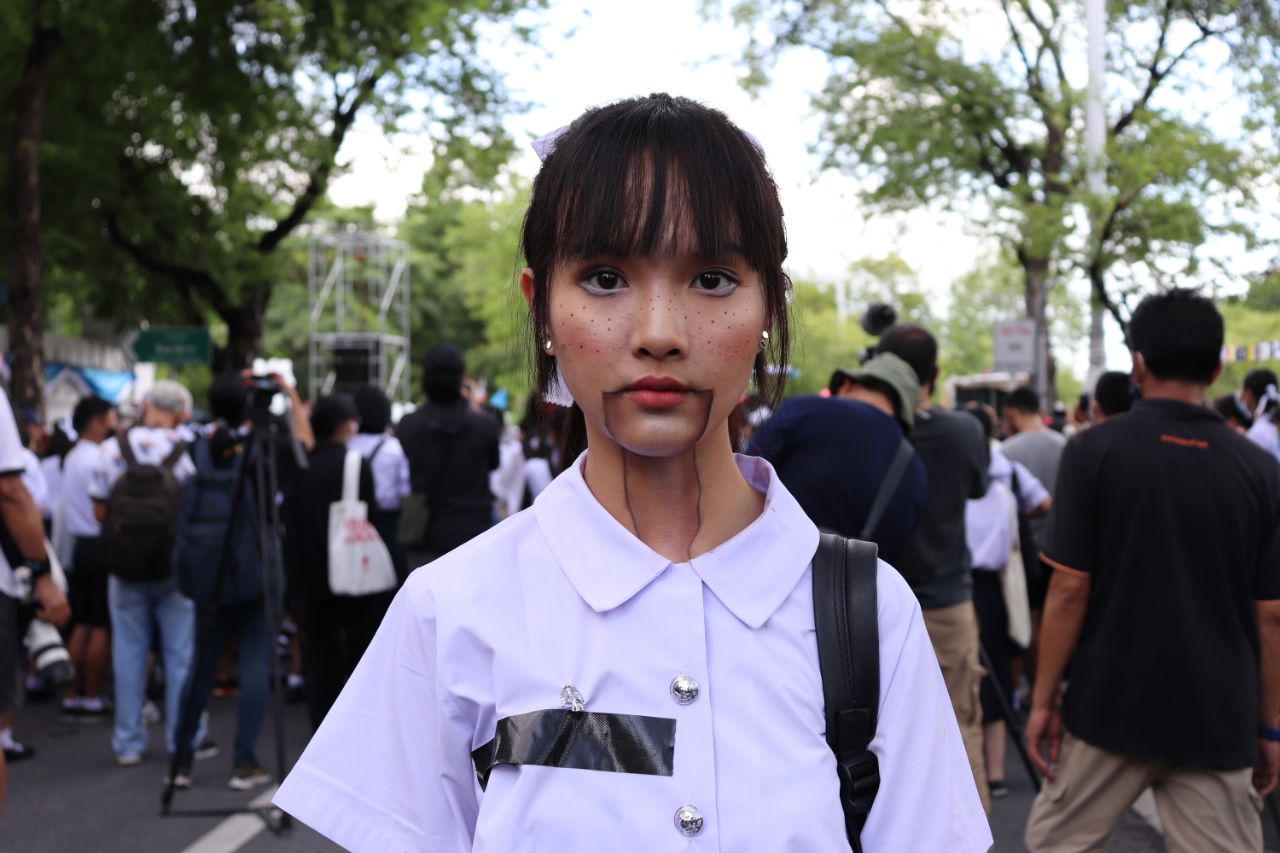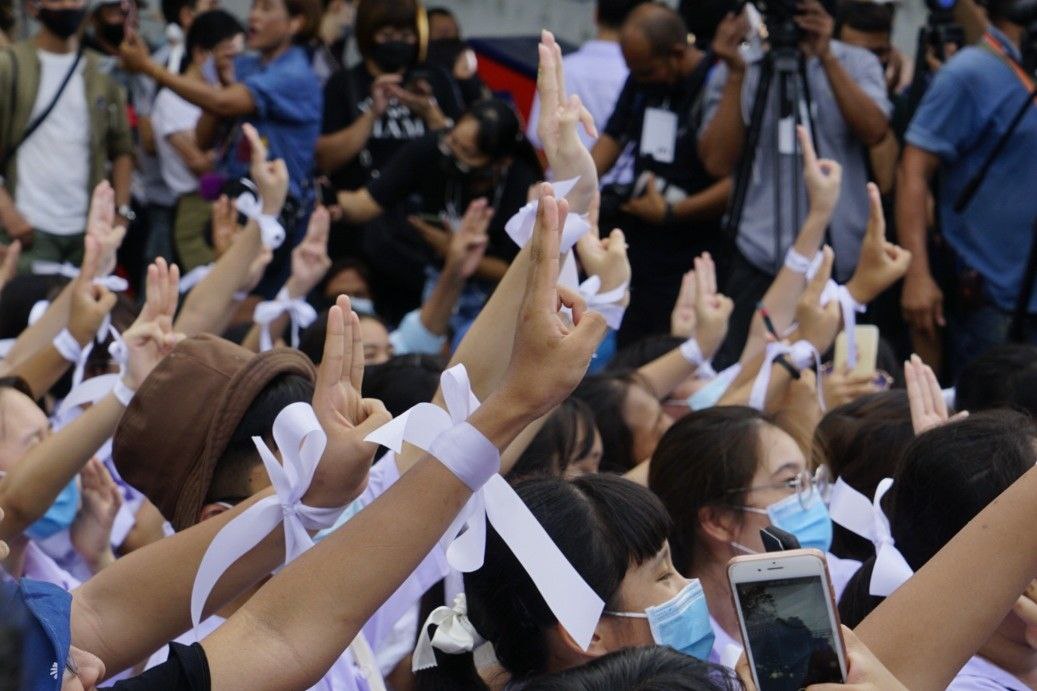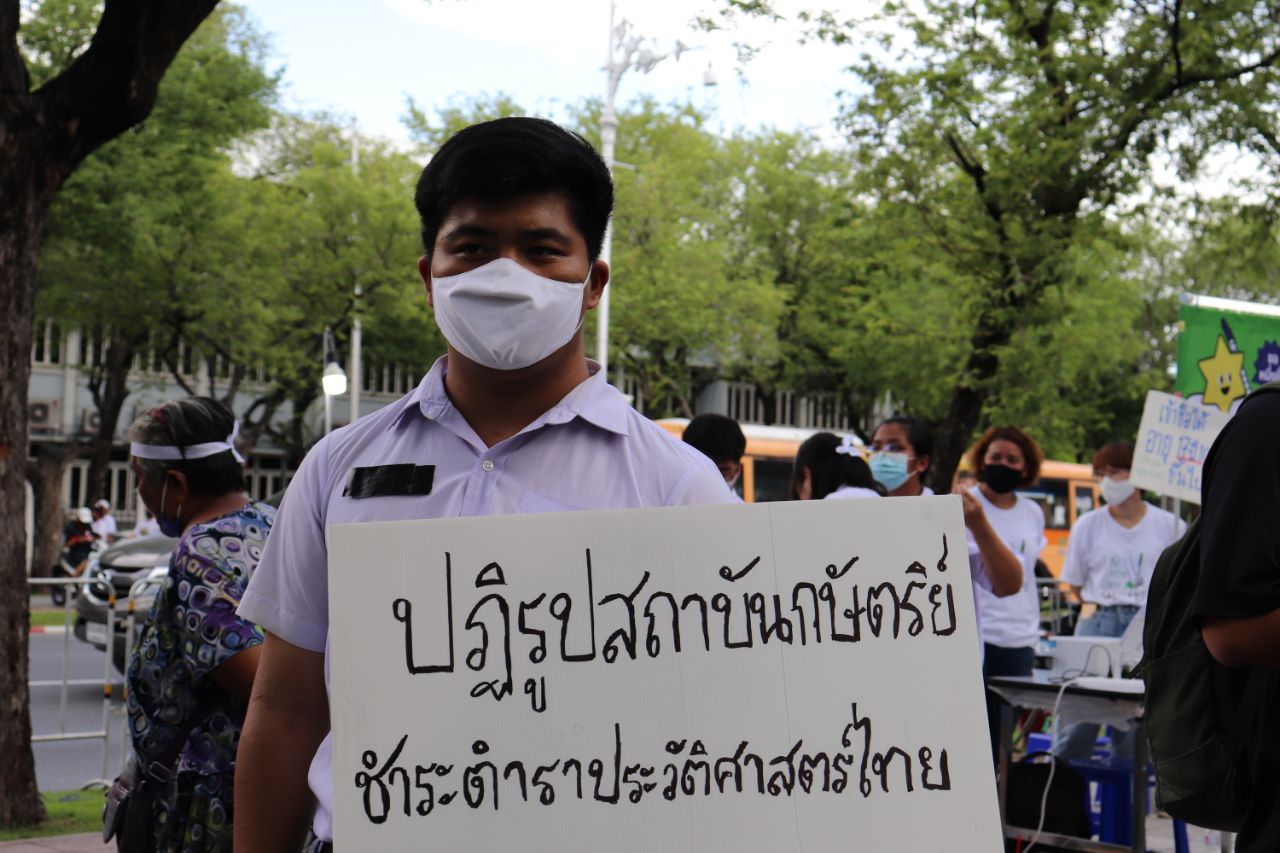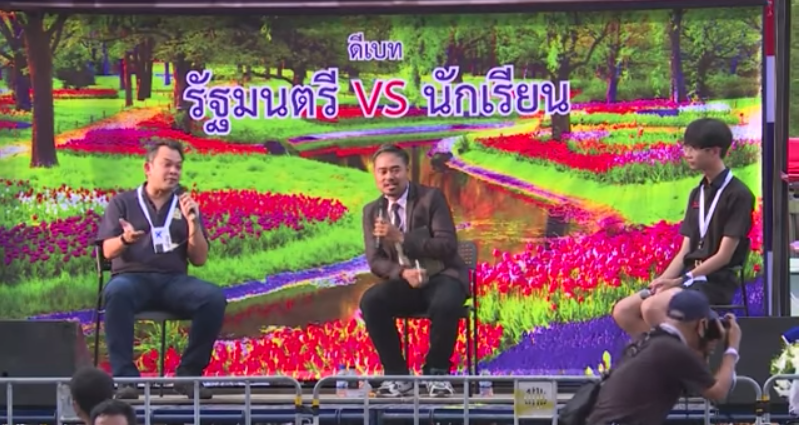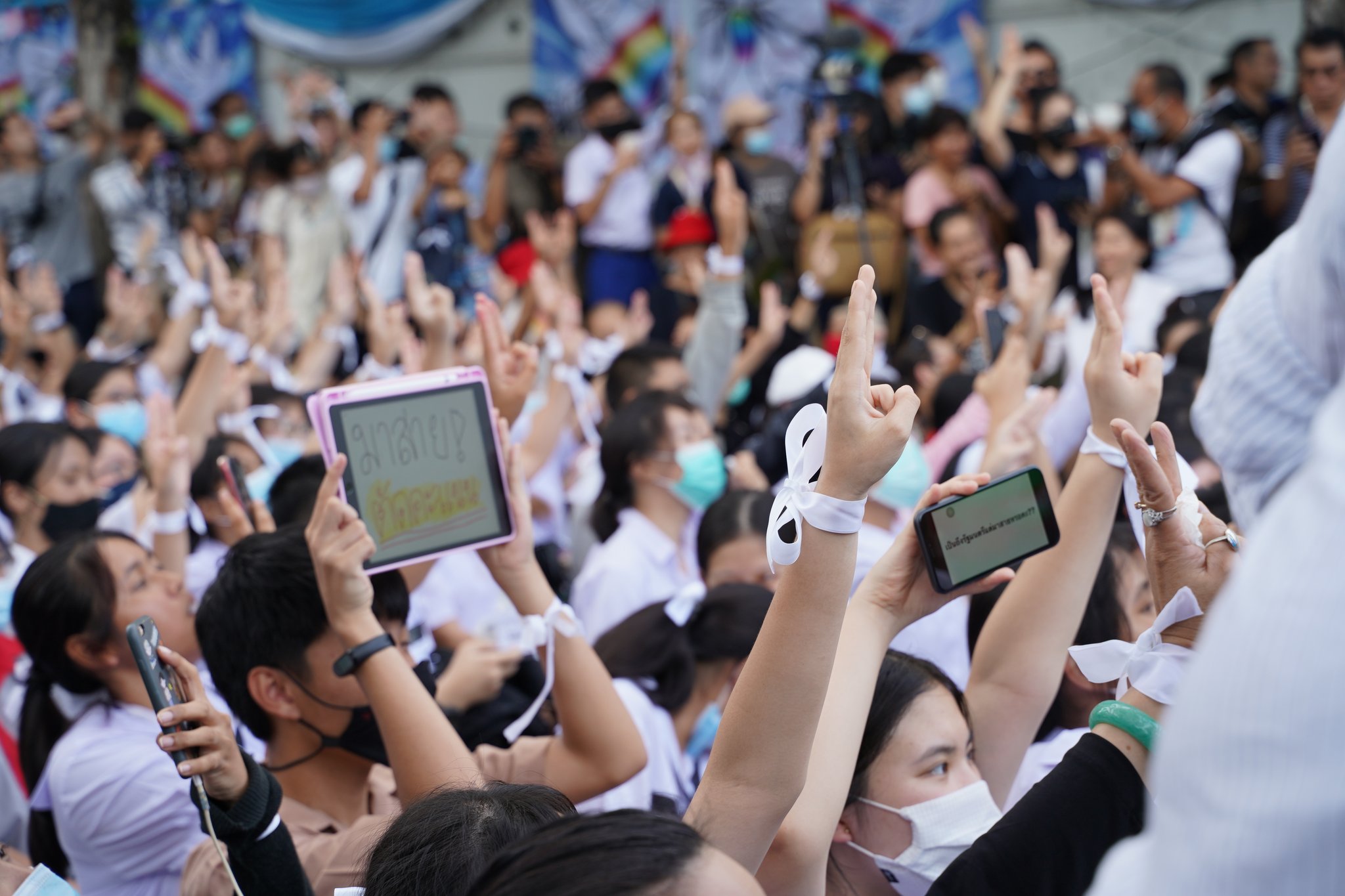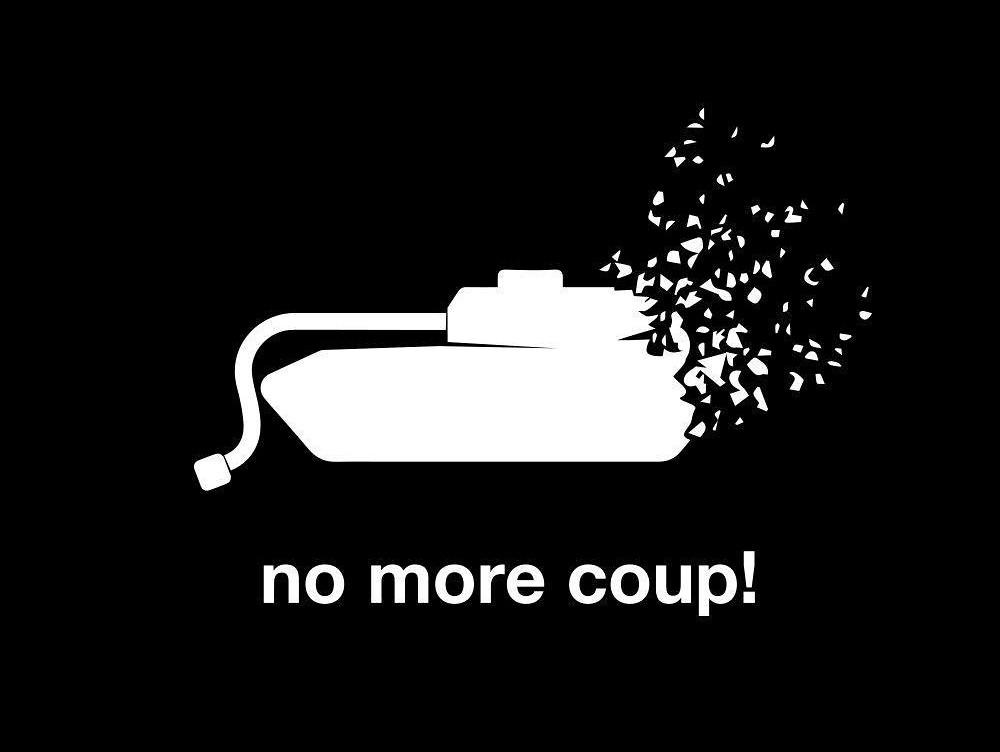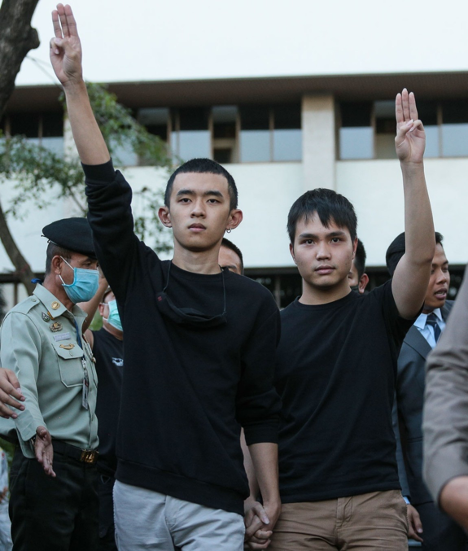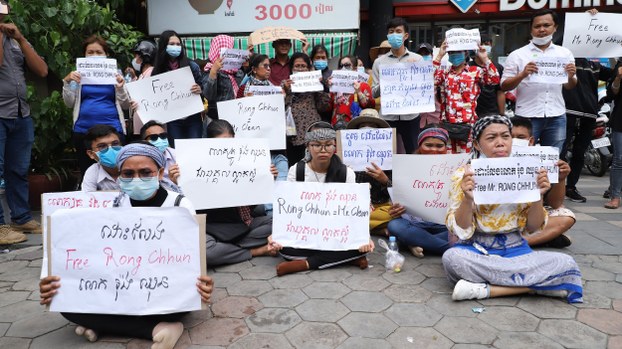
Caption: King Vajiralongkorn and Thai Royal Consort Sineenat Wongvajirapakdi.
Source: Royal Palace
King Vajiralongkorn has deemed Thai Royal Consort Sineenat Wongvajirapakdi ‘unblemished’, according to the Royal Gazette. While her official titles have been restored as if they had never been stripped from her, many Thais welcomed her back with unexpected forms of wordplay.
The Royal Gazette reveals that the order from King Vajiralongkorn has been effective since 28 August. It backdated the announcement to 29 August although it appeared on the official website only on 2 September. According to the announcement, all her royal, bureaucratic and military titles have been restored as if they had never been revoked.
Sineenat Wongvajirapakdi was removed from her post as Royal Consort of King Vajiralongkorn on 20 October last year. The royal announcement of her fall from grace said that Sineenat attempted to make herself Queen and tried to make unauthorized orders on behalf of the King and Queen Suthida. The King made her a Royal Consort in order to reduce the tension, but Sineenat remained dissatisfied and returned the favour with inappropriate behaviour.
Millions of Thais suspected in advance the return of the Royal Consort and the announcement confirmed earlier claims by Thai political refugees. Somsak Jeamteerasakul said on 20 August that Sineenat would be released on 28 August. One million Facebook users were also notified on 27 August when Pavin Chachavalpongpun posted the upcoming event on Royalist Marketplace – Talad Luang.
After the announcement, some spoke in defence of King Vajiralongkorn. For example, royal family member Julajerm Yukol posted on Facebook“The monarchy should have the right to personal life like ordinary people in living their lives.”
However, many Thais welcomed her back with teasing wordplays. Royal World Thailand reported the story in both Thai and English, but the Thai version used unusually informal language including “moving on cyclically” and “the fiercest Royal Consort on earth”.
Royal World Thailand also made observations by asking questions. In the English version they said “What makes him change his mind? And how would this return create another phenomenon to the Monarchy? Particularly Sineenat herself, how would she act in front of the people?”
News about the royal family usually appears daily at 8.00 pm on all television channels using very formal language. Thai has a set of royal vocabulary and usage solely dedicated to the royal family. Never before has news about royal family been reported this way.
Meanwhile, Facebook users in Thailand added ‘unblemished’ on to their profile pictures.

Caption: Jatupat 'Pai' Boonpattararaksa, a political activist who had been in prison due to lèse majesté law, posted on Facebook his profile picture with a message 'unblemished.'
Others also called themselves ‘dogs’ and the meme spread all over social media. In Thai, a ‘dog’ is not only an animal, but also implies a friend who comes between two lovers and encourages the couple to split up during their arguments but they reunite anyway and the friend is left in isolation.
Caption: 'Underground Karaoke' posted a meme of the scouts who howled after the royal announcement. The original video clip 'Wolf Dance' made by Bangkok Metropolis is usually used for primary school education.
Apart from the profile pictures and ‘dog’ memes, a viral quote also appeared on social media: “If a guy wants to meet, Germany is only at the end of the street.”

Caption: 'A comrade of mine', a Facebook page in Thailand famous for sharing anonymous quotes, shared the statement "If a guy wants to meet, Germany is only at the end of the street."
Other reactions are quite serious. Somsak Jeamteerasakul, a Thai political exile, said that the return of the Royal Consort is a part of a bigger problem with the Thai constitution which gives too much power to the monarchy. He said it allowed the King to do things arbitrarily while people pay taxes for his royal servants.
Students also applied the term ‘unblemished’ to their anti-government protests. Free Youth’s Twitter account said that Netnapha Amnatsongsoem was eating noodles near to MRT Yaek Tiwanon waiting to be arrested despite the fact that she was #unblemished. She will be the last of the 15 student activists to be arrested for reading a statement on stage at the anti-government protest on 18 July, one of the largest protests since the military coup in 2014.
เราอยู่ร้านก๋วยเตี๋ยวเป็ด! เนื่องจากร้านขาหมูปิด! ผ่านไปกว่า 1 ชม.แล้วที่ไนซ์ประกาศว่า จะกินลูกชิ้นและข้าวขาหมูรออยู่บริเวณ MRT แยกติวานนท์ หากจะจับ ให้เอาหมายมาแสดง! ไนซ์รออยู่ตรงนี้จนถึงเวลาบ่าย 3! แต่ก็ยังไม่มีเจ้าหน้าที่คนใดมาแสดงหมายจับกับไนซ์ #มิได้เป็นผู้มีมลทินมัวหมองpic.twitter.com/XeHun6ZQL0
— FreeYOUTH (@FreeYOUTHth) September 3, 2020
The return of Royal Consort came amid ongoing anti-government protests which also call for monarchy reform. On 3 August, a group of Thai citizens openly called for monarchy reform in a Harry Potter-themed protest. On 10 August, Anon Nampa outlined a 10-point proposal dealing with the monarchy's legal immunity, the lèse majesté law, the Crown Property Bureau, royal lands, the system of donations to and by the royals, and royalist propaganda.
Yesterday (3 September), Anon's bail was revoked for violating the sedition law. Bangkok Criminal Court also ruled to increase the security for student activist Panupong “Mike” Jadnok. Thai Lawyers for Human Rights (TLHR) said that he will not be seeking bail any longer. Meanwhile, the anti-government protesters posted that they were 'unblemished.'

Source: Wiwata
According to Thailand’s lèse majesté law, defaming, insulting, or threatening the king, queen, heir-apparent, heir-presumptive, or regent is punishable up to 15 years in prison. Royal Consort Sineenat is not protected under this law. Gen Prayut Chan-o-cha also said recently that the King asked the government not to prosecute people under this law.
But the Thai authorities have been using other laws against supposed acts of lèse majesté, making the scope of enforcement even more vague. These laws include the Computer Crime Act which prohibits people from importing information which may threaten national security and Section 166 of the Criminal Code which prohibits sedition. Because of these laws, even though more Thais are openly critical of monarchy, their reactions to the return of Royal Consort Sineenat remain indirect.





